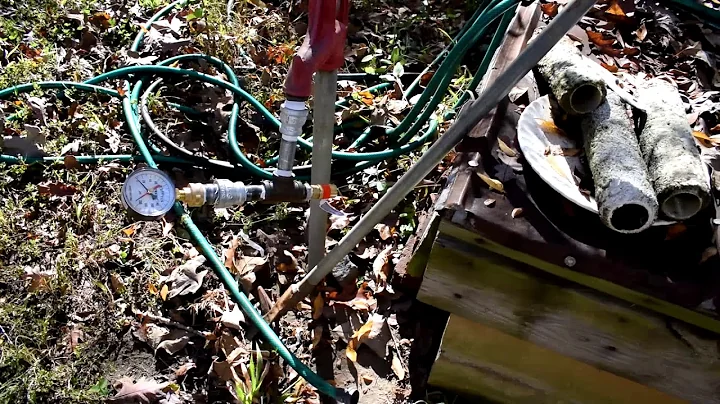Mastering Irrigation System Troubleshooting with a Multimeter
Table of Contents
- Introduction
- Understanding the Components of an Irrigation System
- 2.1 Hydraulic Component
- 2.2 Electrical Component
- The Functions of a Voltmeter in Irrigation Systems
- 3.1 Testing AC and DC Voltage
- 3.2 Testing Continuity and Resistance
- Choosing the Right Voltmeter for Your Needs
- Step-by-Step Guide on Using a Voltmeter for Troubleshooting
- 5.1 Testing Power Source Voltage
- 5.2 Testing the Transformer
- 5.3 Testing Voltage at Stations and Valves
- 5.4 Testing the Resistance of Wires and Solenoids
- 5.5 Testing Continuity for Troubleshooting Sensors
- 5.6 Testing DC Voltage and Batteries
- Best Practices and Safety Tips when Using a Voltmeter in Irrigation Systems
- Conclusion
Introduction
In this training module, we will discuss the functions and usage of a voltmeter in irrigation systems. A voltmeter is an essential tool for locating and diagnosing problems within an irrigation system. It allows you to test AC and DC voltage, continuity, and resistance. By understanding how to use a voltmeter effectively, you can troubleshoot and fix issues within your irrigation system.
Understanding the Components of an Irrigation System
Before we dive into the functions of a voltmeter, let's first understand the two main components of an irrigation system: the hydraulic component and the electrical component.
2.1 Hydraulic Component
The hydraulic component of an irrigation system refers to the water delivery system, including pipes, valves, and sprinklers. It is responsible for distributing water to different areas of your landscape.
2.2 Electrical Component
The electrical component of an irrigation system is connected to the controller and the valves. The controller is powered by either 120 or 240 volts AC, which is then transformed into 24 volts AC. This low voltage is used to control the opening and closing of the valves, allowing water flow to specific areas.
The Functions of a Voltmeter in Irrigation Systems
A voltmeter plays a crucial role in diagnosing and troubleshooting problems within an irrigation system. Let's explore its functions in detail.
3.1 Testing AC and DC Voltage
AC voltage, or alternating current, is the type of electricity used in our homes and buildings. DC voltage, or direct current, is produced by batteries. A voltmeter allows you to test both AC and DC voltage, which is useful in determining if there is sufficient power supply to the system.
3.2 Testing Continuity and Resistance
Continuity refers to the flow of electricity in a closed circuit. A voltmeter can assess continuity, helping you identify any breaks or faults in the circuit. Resistance testing allows you to measure the obstruction in the wire path or solenoid, indicating if there is a short or open circuit.
Choosing the Right Voltmeter for Your Needs
When selecting a voltmeter for your irrigation system, it is essential to consider its capabilities. Look for a voltmeter that can test AC and DC voltage, resistance, and continuity. This ensures you have a versatile tool that can handle various diagnostic tasks.
Step-by-Step Guide on Using a Voltmeter for Troubleshooting
Now, let's walk through the process of using a voltmeter to troubleshoot your irrigation system.
5.1 Testing Power Source Voltage
To begin, you should test the voltage at the power source, such as a wall outlet or electrical panel. This will verify if there is electricity reaching the system and ensure it falls within the appropriate voltage range.
5.2 Testing the Transformer
The transformer plays a vital role in converting the high voltage from the power source to the safe 24 volts AC used by the system. Testing the transformer will ensure it is functioning correctly and providing the necessary voltage.
5.3 Testing Voltage at Stations and Valves
You can use a voltmeter to test the voltage at different stations and valves within your irrigation system. This step confirms if voltage is reaching the intended areas and helps identify any issues with faulty connections or damaged wires.
5.4 Testing the Resistance of Wires and Solenoids
Testing the resistance of wires and solenoids is crucial for detecting shorts or open circuits. By disconnecting the solenoid and using the ohms dial on your voltmeter, you can accurately measure the resistance and identify any faulty components.
5.5 Testing Continuity for Troubleshooting Sensors
Sensors play an important role in irrigation systems, and testing their continuity can help diagnose issues. By disconnecting the sensor wires and checking for continuity, you can determine if there is a break in the circuit or if the sensor is functioning correctly.
5.6 Testing DC Voltage and Batteries
If your irrigation system operates on DC voltage from batteries, you can use a voltmeter to test the battery levels. This ensures that your battery-operated controller has sufficient power to operate effectively.
Best Practices and Safety Tips when Using a Voltmeter in Irrigation Systems
When using a voltmeter in your irrigation system, it is essential to follow best practices and prioritize safety. Here are some tips to keep in mind:
- Ensure all power sources are turned off before conducting any tests.
- Use caution when testing high voltages and consider consulting a licensed electrician for certain tests.
- Follow the specific instructions provided by your voltmeter's owner manual for accurate readings and safe usage.
Conclusion
A voltmeter is an invaluable tool for diagnosing and troubleshooting problems within an irrigation system. By understanding how to use a voltmeter effectively, you can locate and fix issues with power supply, continuity, resistance, and more. Remember to prioritize safety and follow best practices when using a voltmeter in your irrigation system.
Resources:







